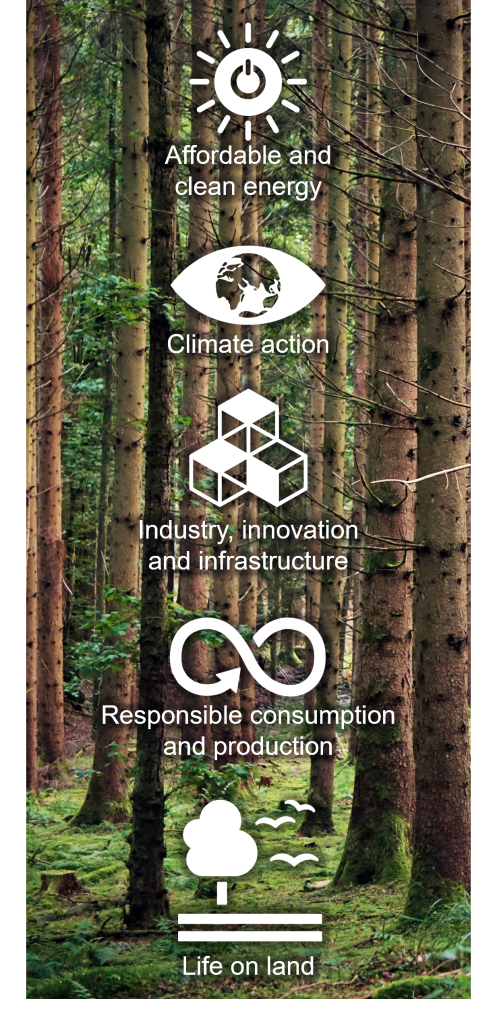 GLOBAL CHALLENGES
GLOBAL CHALLENGES
Bio4Energy’s research is driven by challenges and needs of the society to achieve national and international energy and climate policy goals.
Our focus is on aiding the growing bioeconomy by generating knowledge on how to move from fossil-dependency to renewable energy and feedstocks, in a way that is both resource-efficient and sustainable in economic, ecological, and social terms.
Below we outline the central parts of the landscape of challenges and targets that motivate our research and activities.
The bioeconomy challenge in a Swedish perspective
Sweden has ambitious goals regarding sustainable development and a bio-based economy. Current Swedish objectives and policy instruments indicate that the relevance of research, development and education related to biorefining of biomass, residues and waste will remain high or even grow in the near future (see, e.g., Swedish Climate Policy Framework, 2020; SOU 2020:4). The strong position in forestry and conventional forest industry that Sweden has can facilitate a transition to a bio-based economy, and forest resources can contribute to both job creation and sustainable growth. Key areas in this aspect are sustainable forest management, multiple uses of forest resources, and world-class innovation with regard to processed forest products (Sweden’s National Forest Programme, 2020).
A transition to a bio-based economy requires educated people that can address the challenges that lie ahead. Academy and long-term research programs play major roles in the education of skilled personnel to the industry and to other sectors of society.
European Union’s Climate and Energy Framework
The EU aims to be a climate-neutral economy by 2050, with net-zero greenhouse gas emissions. All parts of society and economic sectors will play a role – from the power sector to industry, mobility, buildings, agriculture and forestry. Biomass and biofuels are acknowledged as important to help lowering the EU’s external energy dependence and contribute to reduced greenhouse emissions – but they must be produced, processed and used in a sustainable and efficient way in order to optimise greenhouse gas savings and maintain ecosystem services.
The 2030 Agenda for Sustainable Development, adopted by all United Nations Member States in 2015, provides a shared blueprint for peace and prosperity for people and the planet, now and into the future. At its heart are the 17 Sustainable Development Goals (SDGs), which are an urgent call for action by all countries – developed and developing – in a global partnership.
Bio4Energy’s research relates to several of the Sustainable Development Goals, of which the following are of particular relevance:
Goal 7 — Ensure access to affordable, reliable, sustainable and modern energy for all
Our research aims to contribute to increasing the share of renewable energy in the global energy mix (target 7.2). We also work for enhanced international cooperation, both to facilitate access to clean energy research and technology, and to promote investment in energy infrastructure and clean energy technology (target 7.a).
Goal 13 — Take urgent action to combat climate change
Knowledge generated from our research can contribute to integrating climate change measures into national policies, strategies and planning (target 13.2). We also focus on contributing to improved education, and building awareness and human and institutional capacity on climate change and its mitigation (target 13.3), in particular within higher education.
Goal 9 — Build resilient infrastructure, promote inclusive and sustainable industrialization and foster innovation
Promoting the upgrading of infrastructure and retrofit of industries to make them sustainable, with increased resource-use efficiency and greater adoption of clean and environmentally sound technologies and industrial processes (target 9.4) is central to Bio4Energy’s activities.
Goal 12 — Ensure sustainable consumption and production patterns
At the core of Bio4Energy’s research lies limited resources. We thus put much focus on sustainable management and efficient use of natural resources (target 12.2) and substantially reduced waste generation (target 12.5). For both existing and new processes we advance environmentally sound management of chemicals and wastes throughout their life cycle, to reduce their release to air, water and soil and to minimize their adverse impacts on human health and the environment (target 12.4).
Goal 15 — Protect, restore and promote sustainable use of terrestrial ecosystems, sustainably manage forests, combat desertification, and halt and reverse land degradation and halt biodiversity loss
With Bio4Energy’s focus on processes that utilize residual and waste streams, we strive to achieve increased resource efficiency. This is closely linked to promotion of sustainable forest management (target 15.2), in order to avoid conflicts with other environmental goals.





